This December, we’re taking a trip back in time to review the ninth season of The X-Files.
Very few television shows end when they should.
As much as television might be an artistic medium, it has generally been governed by commercial realities. The length of a television episode is not determined by the volume of the story that needs to be told, but is dictated by the slot allocated it with room left over for advertising. The length of a season is typically negotiated between the demands of the creative team and the needs of the network. Popular shows are seldom allowed to retire at a natural end point, but are instead extended until they reach viable syndication figures or the audience loses interest.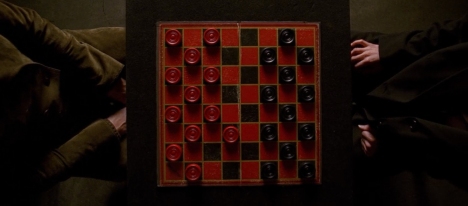
Things are changing, to a certain extent. The emergence of cable television has allowed creators a greater degree of freedom in how they want to tell their stories. Television series are allowed to wrap up on their own terms, even when they are at the height of their popularity. There is even a bit more give-and-take when it comes to scheduling shows that do not fit comfortably within the standard hour-long block. This allows shows like Breaking Bad, The Sopranos and Mad Men the chance to conclude at a point where it is organic to do so.
However, this was not the television landscape in which The X-Files emerged. Although it helped shape and define television in the nineties, The X-Files was very much a product of the network television system. That meant extended season runs, but it also meant that the show was sustained as long as it remained popular. Due to the fact that television audiences tend to drain rather than spontaneously disappear, this meant that the show was arguably extended years past an organic end point. Indeed, The X-Files had several logical end points.

The plan was to wrap things up after five seasons, meaning that The End might have been the end, and that the show might never have moved from Vancouver to Los Angeles. However, the show was extended for two seasons as ratings declined from their peak. At the end of the seventh season, Requiem was written and filmed before anybody knew there would be an eighth season. A disastrous television season forced Fox to renew the show. The eighth season ended with Mulder and Scully in a happy place in Existence, but was such a success that Fox greenlit a ninth season.
It is interesting to wonder what might have become of The X-Files had the show ended at any of those three logical end points. Would the show be more fondly remembered? Would the general consensus be that the series had ended in a reasonable place? Would fans be relatively satisfied with what had been offered? Would recommendations of the show be a lot less guarded than they would become in the years ahead? There is no way to know the answers to any of these questions. However, there is no getting around the fact that the ninth season is a disaster.
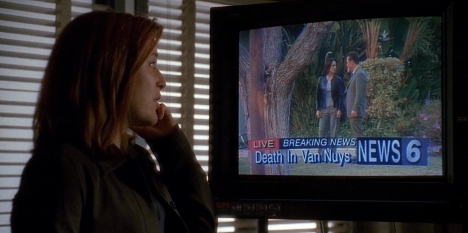
In hindsight, it was a minor miracle that the eighth season worked at all. David Duchovny had grown tired of the demands and restrictions imposed by the show, and had decided to move on to pastures new. At the last minute, he agreed to appear in approximately half of the twenty-one episode season. While this was a significant improvement upon the idea of an eighth season without Duchovny, it still posed a whole host of challenges. Given that Mulder was an iconic and recognisable part of The X-Files, trying to do the show without Mulder was a risky proposition.
Somehow, it worked. It worked for a number of reasons. Robert Patrick was phenomenal and the character of Doggett was compelling in his own right. David Duchovny’s schedule imposed a clear structure on the season, forcing the writers to plot and plan ahead of time. The production team seemed invigorated by the challenge posed by the absence of Mulder. The hunt for Mulder, his inevitable return, and the lingering questions around Scully’s pregnancy created an intriguing narrative framework with clear resolutions.

The eighth season is genuinely underrated. There is an argument to be made that it is one of the best seasons of the show, with a consistency that was only ever matched by the third season. There is a breathtaking energy and ambition to the eighth season that helped to shore up the declining ratings and even win back lost viewers as television ratings were declining across the board. The eighth season also seemed to push the show forward, embracing the idea of the season arc and serialised storytelling in a way the show had never attempted before.
The ninth season was just as risky. David Duchovny was gone, completely. Duchovny had made it clear that he was not coming back in any capacity, even for a cameo or a guest spot. Gillian Anderson had one foot out the door, signalling that she expected a reduced workload across the ninth season and that she would most likely not be back for a hypothetical tenth season. The show’s mythology had largely unravelled, and Doggett and Reyes had been assigned to work the X-files.

As such, the ninth season represented a big shift for the show. However, the eighth season had demonstrated that the production team were perfectly capable of making such a transition skilfully and gracefully. The problem with the ninth season is that it feels like the production team immediately forgot everything that made the eighth season so successful in the first place. Rather than building (and improving) upon what came before, the ninth season completely disregards it.
This is true in multiple ways. The ninth season tends to ignore the central thematic points of the eighth season. The final arc of the eighth season was largely about how Mulder and Scully needed to learn to leave the X-files behind. Three Words was an episode about how Mulder was no longer driving the show, while Alone featured Scully retiring from the unit and leaving Doggett to fend for himself. The eighth season built to the idea that Mulder and Scully had found each other and no longer needed their work. That was “the truth” of Essence and Existence.

The ninth season immediately undercuts this, refusing to let Mulder and Scully go. Mulder is more important to the mythology of the ninth season than he ever was in the eighth season, with the show awkwardly trying to work around the fact that David Duchovny had lost all interest in the show. Nothing Important Happened Today I featured Mulder’s stunt butt before it featured any of the show’s actual lead characters. Trust No 1 features Mulder glimpsed in the distance. Providence makes him a mythic figure. William suggests he has returned disfigured.
Mulder is never far from the show’s mind. The character is constantly mentioned, even in the stand-alone episodes of the season. Both the first (Dæmonicus) and last (Sunshine Days) “monster of the week” episodes draw attention to Mulder’s absence. It is very disconcerting. At least during the eighth season, the constant allusions to Mulder in episodes like Badlaa all pointed towards the character’s return in the final third of the season. Even the inclusion of Mulder via stock footage in Trust No 1 and Jump the Shark feels cynical.

By the time that Mulder returns in The Truth, the ninth season has turned him into a mythical figure. Not just in the colonists’ mythology. During Mulder’s absence, it feels like the ninth season has built the character up to the point where he is less a human being and more an incorruptible symbol of all that is good and righteous in the world. When Mulder returns in The Truth, every other character immediately cedes the stage to the former lead. Mulder’s sense of humour is turned down low, but his self-righteousness is amped all the way up.
This treatment of Mulder is perhaps the most obvious example of how the ninth season fails to learn from what worked in the eighth season. The treatment of Scully and William is another example. The eighth season generated a fair amount of ambiguity around Scully’s pregnancy, inviting the audience to wonder whether Scully was carrying an alien baby. Essence and Existence heavily suggested that William was a more benign sort of miracle, one unrelated to colonists or conspirators; William was the result of true love. As such, Mulder and Scully could leave the X-files.
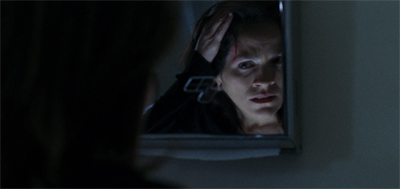
Unfortunately, the ninth season immediately undercuts this. Nothing Important Happened Today II suggests that William was part of a secret plot tied to the new “super soldier” mythology that involved gestating these soldiers inside human hosts. This is a rather inelegant piece of retroactive continuity for a number of reasons, including the fact that Scully became pregnant long before the mythology embraced the idea of “super soldiers.” It also completely undercuts the entire point of Essence and Existence by making William a mystery tied to the mythology.
However, the ninth season could not even remain internal consistent. While the premiere suggested that William was the result of government-run “super soldier” trials, episodes like Trust No 1 and Providence suggested that William was a child prophecised to lead the human race to safety or damnation. William was retroactively rendered as a “chosen one.” Of course, these two cliché approaches of integrating William into the mythology are not mutually exclusive, but they do demonstrate that the production team are a little too eager to tie him into the conspiracy.
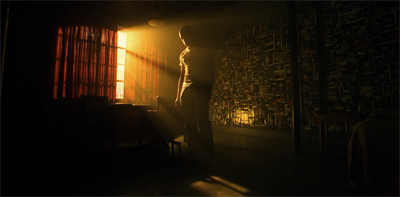
This chips away at the central idea of Essence and Existence. The eighth season finalé was about how William essentially represented a life beyond the conspiracy to Mulder and Scully. William represented the end of their journeys; Mulder was able to piece back together the family he lost when Samantha was taken and his parents divorced, while Scully is finally allowed to become a mother despite all the horrible things that were done to her by men in positions of power. William is the end of something, not a launching pad to something new.
It does not help matters that William has no agency of his own. William is a baby. While episodes like Nothing Important Happened Today I and Provenance suggested that William had super magical powers, William is not a character who can do much within the context of the show around him. In fact, when William saves his own life in Providence by powering up an alien ship and killing a bunch of cultists, it feels like a forced deus ex machina. William is a baby, and babies don’t tend to make the most dynamic television characters.
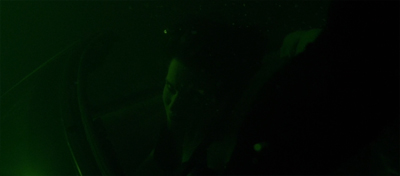
This means that Scully is put in an awkward position. For most of the ninth season, Scully is force to act by proxy for Mulder or William. In Nothing Important Happened Today I, Doggett is forced to address his questions for Mulder to Scully. In Trust No 1, Scully is used to arrange a meeting with Mulder. In Providence, Josepho tries to force Scully to murder Mulder. Although Sunshine Days never forgets that Scully is her own character, Scully is still used as a voice for Mulder.
Similarly, Scully’s agency is frequently usurped by that of William. In Nothing Important Happened Today II, Scully is forced to search for answers relating to William’s identity. In Provenance, Scully is thrown to her wits end as Robert Comer tries to murder William and Josepho succeeds at kidnapping William. In William, Spender poses as Mulder in order to get closer enough to Scully that he can attack William. In all of these cases, Scully’s own character is subsumed by her relationship to William.
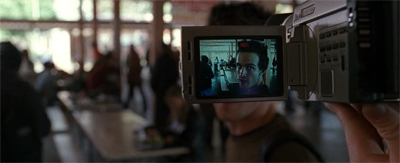
Despite the fact that Gillian Anderson is an Emmy-winning actress and despite the fact that this is Scully’s last year on the show, the production team never seem particularly interested in Scully as a character. Despite the fact that Scully was a remarkably progressive character at certain points in the run, the ninth season seems to reduce her to little more than a gender stereotype. Scully is frequently treated as nothing more than a “mother” or a “lover”, rather than an expert or an investigator in her own right.
The show clearly has no idea what to do with Scully, but is reluctant to release her. As a result, the ninth season spends a lot of time with Scully without affording her anything to do. This is most striking in Dæmonicus, the first stand-alone episode of the season. The first stand-alone should be devoted to Doggett and Reyes, demonstrating their own unique approach to investigation and making the show their own. Instead, the script devotes far too much time to explaining what Scully is doing, despite the fact she contributes little to the plot beyond being captured.

This is a recurring problem across the ninth season, with episodes that contort and bend to include more Gillian Anderson without any real justification. Shows like Lord of the Flies and Scary Monsters might have been stronger had they been willing to trim (or cut entirely) the subplots involving Scully. Better management of the schedule would have allowed Anderson to take time off when filming a Scully-irrelevent episode so that the character could be more involved in an episode that justifies Scully’s involvement, like Jump the Shark.
There are ways to include Scully in the ninth season, but they are few and far between. Release is the only episode to make good use of Scully’s assignment to Quantico, and that comes three episodes before the end of the show. There is a sense that the ninth season might have been better had it been willing to bump Scully back to the pool of recurring characters like Skinner, Kersh and Follmer. Certainly, episodes like 4-D and Audrey Pauley make good use of Scully as a moral support to the next generation of X-Files leads.

Unfortunately, the ninth season is far more interested in Scully than it is in Doggett and Reyes. This is a problem, given that Doggett and Reyes are supposed to be the new lead characters, and the actors who actually appear in all of the season’s episodes. It is worth noting the many of the season’s strongest episodes – 4-D, John Doe, Hellbound, Audrey Pauley, Release – focus on Doggett and/or Reyes far more than Scully. Even the other episodes that work – Improbable or Sunshine Days – tend to allocate more space to Doggett and/or Reyes than the episodes that don’t.
The ninth season seems openly resentful of Doggett and Reyes, as if the production team are frustrated at the thought that they no longer have access to Mulder and Scully. Rather than taking advantage of Gillian Anderson’s involvement to help build up Doggett and Reyes to the point where they might be able to carry the show, the ninth season works hard to steal the spotlight out from under them at every possible opportunity. The show suggests interesting avenues for the characters, but then refuses to do anything with them.

There is a very obvious window for John Doggett into the ninth season mythology. John Doggett is a soldier, and the ninth season mythology is built around “super soldiers.” Indeed, Nothing Important Happened Today I suggests that the “super soldier” programme might have its roots in Doggett’s former unit. Doggett has a history with two of the show’s “super soldier” characters, Knowle Rohrer and Sharon MacMahon. Given the Gulf War flashbacks that open Providence, it seems a main character who was a former marine should have an angle on this.
Unfortunately, the show clearly does not think so. Doggett’s past is brushed over and ignored at points where it should provide dramatic fodder. When Sharon MacMahon rescues Doggett in Nothing Important Happened Today II, she is using him to get access to Scully. When Doggett confronts Rohrer at the climax of The Truth, there is absolutely no personal connection between the characters despite their service together. Doggett spends most of Providence in a coma.

This disinterest bleeds over into the stand-alone stories. In Scary Monsters, the character of Leyla Harrison spends most of the episode complaining that Doggett and Reyes are nowhere near as good as Mulder and Scully. However, the episode seems to have no idea what distinguishes Doggett and Reyes from Mulder and Scully. When Doggett is confronted with an eight-year-old boy with the power to manifest monsters, the loss of Luke Doggett never even comes up. Doggett feels remarkably comfortable putting that child’s life in danger.
The ninth season is similarly disinterested in Reyes. In many ways, Reyes is the least developed member of the ensemble. She was the last regular character to be introduced, only appearing in four episodes of the eighth season. Those episodes do little to define Reyes beyond “she’ll believe anything.” As such, it feels like the ninth season should probably prioritise the development and definition of Monica Reyes. If the character is to be a lead character, she needs to be fleshed out to the point that she may support the show.
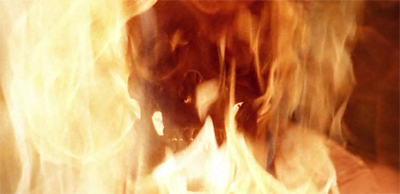
The ninth season has no such interest. Dæmonicus starts as a Reyes story focusing on her history of investigating satanic ritual crimes, but the focus quickly shifts to Doggett’s interrogations of Josef Kobold and Scully’s new role in the show. Hellbound would have been the show’s first Reyes-centric episode, but it was pushed much later in the schedule. Vince Gilligan was working on the Doggett-and-Reyes-centric John Doe, but writer’s block pushed that back towards the middle of the season.
It is interesting to wonder what might have happened had the ninth season began with more confidence in and comfort with its new lead characters. Would fans remember the ninth season more fondly had Hellbound, 4-D and John Doe all aired towards the start of the year? Would it have made the production team willing to invest more energy in and focus on the characters of John Doggett and Monica Reyes? Would it have changed the general tone of the final season?
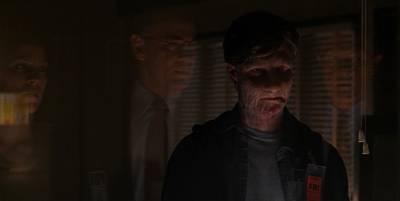
Whatever an earlier and stronger focus on Doggett and Reyes might have accomplished, it seems unlikely that it could have saved the show. The ninth season is probably the weakest year in the entire run, but that lack of quality was not necessarily a deciding factor in the cancellation of the show. The ninth season had been commissioned on the strength of the ratings growth during the second half of the eighth season. There were points at which the eighth season’s ratings improved upon those of the seventh, the first such growth in quite some time.
The ninth season was unable to maintain that audience. In fact, a significant portion of the audience disappeared between Existence and Nothing Important Happened Today I, only checking back in for The Truth at the end of the season. There are a lot of possible reasons for this sharp drop. Maybe Fox didn’t promote the show right. Maybe the audience were happy to leave with the closing shot of Existence. Maybe The X-Files no longer reflected the times in which it was broadcast. The ninth season was the first season of the show to be broadcast after 9/11.

To be fair to the production team, the ninth season did attempt to deal with the fallout from the events of 9/11. Trust No 1 is a powerful and prescient commentary on the surveillance state, even if it is a mess in absolutely all other respects. Provenance and Providence open with a religious extremist crossing the Canadian border in the United States. The most effective sequences in The Truth explore the way in which anti-terrorist policies are harnessed against Mulder while he is detained and as he is tried.
The Truth is particularly pointed, with several characters making thinly-veiled references to the threat posed by the policies of the administration of George W. Bush. In fact, the original final scene of the show would have revealed the mysterious “Toothpick Man” meeting with George W. Bush. That scene was eventually cut from the broadcast version of the episode, but it does suggest that the ninth season of The X-Files still had teeth and was willing to use them. Given the conservative subtext of the eighth season, this aggressive liberalism is exciting.
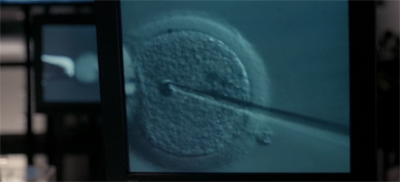
However, while the production team might have been willing to embrace and explore post-9/11 realities, it seems likely that the audience were not entirely comfortable. The X-Files was a show about paranoia and mistrust, centred on the idea that questioning authority is always a good idea. In the wake of 9/11, audiences did not want to question authority. Audiences wanted to feel safer, to believe that they could trust those in authority to protect them from the bad people in the world. They wanted Jack Bauer instead of Fox Mulder.
There is a larger issue. The X-Files was a show very much rooted in the mood and aesthetic of the nineties. Chris Carter managed to perfect capture the zeitgeist, reflecting contemporary anxieties in his scripts and dialogue. The X-Files was perfectly suited to that long pause between the fall of the Berlin Wall and the destruction of the Twin Towers. In a time of relative peace and prosperity, The X-Files was willing to shine lights into the dark corners of the American psyche.

More than that, the show was cutting edge for its time. The X-Files might not have pioneered the idea of long-form serialised storytelling on prime-time television after Dallas and Dynasty, but it did popularise it. The X-Files pushed the limits of nineties television. It was no exaggeration to suggest that The X-Files was more cinematic than any other show airing in the early nineties. The production team were bold and ambitious, working at the very top of their game.
However, it was no longer the nineties. What had been groundbreaking and exciting now seemed trite and familiar. Television had evolved in other directions, leaving The X-Files behind to stagnate. The X-Files started out looking like a new movie every week, but it ended up feeling like yesterday’s television. This was most evident in the mythology. Provenance and Providence tried to recapture that old epic mythology feel, only to look outdated by the standards of modern television. The Truth was a clip show, unapologetic and unironic. The X-Files felt old.

The eight season had pushed the show into the twenty-first century. The final third of the eighth season is surprisingly serialised; the episodes are all distinct, but they do offer a single long-form narrative about Mulder and Scully preparing to leave the FBI and the X-files. In contrast, the ninth season is rigidly episodic. Even after news of cancellation filtered on down, the episodes remained separate and distinct. While the eighth episodes at the end of the eighth season had to be watched in order, the final episodes of the ninth season could be jumbled around.
As a result, The X-Files felt like a nineties television show that lingered on far too long. The events of 9/11 were shocking and harrowing, and they changed the world. They marked the end of the nineties, and arguably rendered The X-Files largely redundant. The ninth season frequently feels like the show is sleepwalking as it waits for the end to come. That end does not arrive with a bang, but in a prolonged whimper. The X-Files missed its opportunities to retire on its own terms.
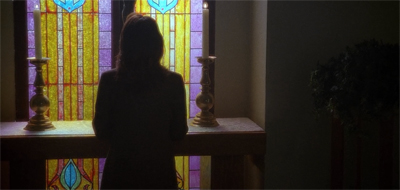
The final stretch of the season is incredibly frustrating. The X-Files always struggled with closure, because asking questions was always easier than answering them. The original mythology outstayed its welcome significantly. The ideal point to end it might have been at the show’s peak, when the entire world was watching. Nevertheless, The X-Files: Fight the Future kept the mythology going well past its prime. When Chris Carter and Frank Spotnitz promised closure with Two Fathers and One Son, the mythology still shuffled around like a zombie until Requiem.
Still, the show had resolved most of its lingering questions seasons ago. Although it took a year-and-a-half to properly die, the old mythology was dead and buried with the Cigarette-Smoking Man in Requiem. Sein und Zeit and Closure had offered a definitive (if convoluted) account of what actually happened to Samantha Mulder. Mulder and Scully had kissed in Millennium and slept together in all things, having a child in Existence. Not all of these endings were neat, but they were still endings.
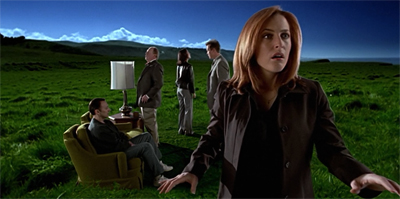
This put the ninth season in an awkward position of having to end things without having too many things to end. The final stretch of the ninth season is a delightfully ironic mess, with The X-Files getting a little overzealous in its attempt to tidy up loose ends. Jump the Shark cares not a whit that the Lone Gunmen did not need to die. Release does not care that the mystery of Luke Doggett and the character arc of Brad Follmer are best left unresolved. Fans and critics were demanding closure, and so The X-Files offered closure.
Of course, it was not really closure. Watching the end of the ninth season, it is quite clear that Chris Carter was hoping to transition towards a series of feature films. Chris Carter had been hoping for a feature film franchise for quite some time. The original plan had been to end the series after five seasons and springboard into a series of feature films. However, the sequel to Fight the Future never materialised. With the show finally winding down, Carter was free to launch his series of cinematic stories.
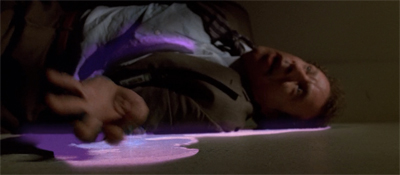
William does a delightful job of shooting the show in the foot, by trying to tidily resolve all the plot threads involving William only to create a conspicuous absence. The goal of William was to brush the baby aside so that he did not crowd out the feature films, but the episode ironically casts a shadow larger than the baby himself. The X-Files: I Want to Believe is haunted by William, despite the fact that the episode was specifically designed to prevent such an occurance.
There is a similar irony to The Truth. At the start of the final episode, Mulder discovers that colonisation is due to take place in December 2012. This seems like an obvious set-up for the movie franchise to deal with, allowing the production team a bigger budget with which them might explore colonisation. However, the film franchise was stillborn. Legal wrangling delayed I Want to Believe until 2008. The box office failure of I Want to Believe blocked any follow-ups. As such, 2012 came and went without any colonisation or any X-Files.

The Truth becomes something of a cliffhanger that never played off, an ironic echo of The Lone Gunmen only a season earlier. It is a reminder of just how messed up the ninth season was, how many mistakes and miscalculations were made and how many twists of fate served to sabotage the year. The ninth season of The X-Files was always going to be a difficult year, but it turned out to be a spectacular fiasco. The death of The X-Files might have been a whimper, but it was a long and drawn out one at that.
At the same time, there are some interesting elements to the ninth season. The eighth season had opted for a very dark visual aesthetic, returning to the darkness and shadows that defined the Vancouver era of the show. The ninth season seems to rebel against this, favouring lots of bright colours and stylised compositions. There is an argument to be made that the ninth season of The X-Files was decidedly cartoonish, with its emphasis on “super soldiers”, its return to comedy episodes as a lip-synching episode starring Burt Reynolds as God.

This striking emphasis on colour is evident from the opening shot of Nothing Important Happened Today I. Light is a very important part of the ninth season, from the green night cameras in Trust No 1 to the grainy yellow of Mexico to the glowing stain glass in Providence to the golden dawn in Release to the purple glowing ooze in Jump the Shark to the primary colour nostalgia of Sunshine Days to the sixties primary colours in Mount Weather at the start of The Truth. The ninth season has a very distinct visual identity.
There is also a recurring theme of unreality, with reality as a very fragile (and easily splintered) object. This is reflected both in narrative and production choices. 4-D finds Reyes investigating a parallel world, while Audrey Pauley finds Reyes trapped in a version of limbo based on a scale model of a hospital. In Scary Monsters, a child with the ability to alter reality is controlled through television. In Sunshine Days, another child with the ability to alter reality seeks refuge in a world created from television. Trust No 1 views the world through television screens.
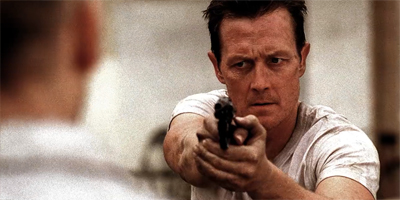
Various production choices reinforce this feeling of uncertainty, with The X-Files repeatedly drawing attention to its existence as a television show. The ninth season alters the motto that at the end of the opening credits more frequently than any other season. The teaser of 4-D was shot in reverse, a small touch that required incredible amount of production design. The version of Mexico in John Doe is plucked from popular culture rather than literal geography. Aubrey Pauley and Scary Monsters seem to nod towards the Tommy Westphall Hypothesis.
In some respects, this is a continuation of a theme that was developed during the seventh season (and which ran through Harsh Realm). Both the seventh season and Harsh Realm were similarly fascinated with the idea that reality might be an illusion. That anxiety was rooted in millennial uncertainties, the same nervousness bubbling through films like The Matrix or Dark City or The Thirteenth Floor. The ninth season’s worries about the fragile nature of reality perhaps reflect post-9/11 anxieties, capturing the feeling of the unreal intruding on the real.

These are interesting ideas, but they do not add up to a convincing whole. At best, the ninth season feels like a curiousity. It is not often at its best.
You might be interested in our reviews of other seasons of The X-Files:
- Season 1
- Season 2
- Season 3
- Season 4
- X-tra: Millennium – Season 1
- Season 5
- Season 6
- X-tra: Millennium – Season 3
- Season 7
- X-tra: Harsh Realm
- Season 8
- X-tra: The Lone Gunmen
- Season 9
You might be interested in our reviews of the ninth season of The X-Files:
- Nothing Important Happened Today I
- Nothing Important Happened Today II
- Dæmonicus
- 4-D
- Lord of the Flies
- Trust no 1
- John Doe
- Hellbound
- Provenance
- Providence
- Audrey Pauley
- Underneath
- Improbable
- Scary Monsters
- Jump the Shark
- William
- Release
- Sunshine Days
- The Truth
Filed under: The X-Files | Tagged: chris carter, Television, the x-files, x-files |




















I think I figured it out. The link in your Master List for Season 10 overview brings you here.
Deadly. Corrected! Cheers!
Season 8 last episode and season 9 first episode make no scense to me. I didnt watch nor found an episode abt Deputy director saying “have you found any incriminating evidence on me yet”. Am I missing smth here? Did i miss some episodes in season 8?
At the end of season 8, Doggett opens an investigation on Kersh.
At the start of season 9, all the evidence has disappeared and Doggett is back to square one.